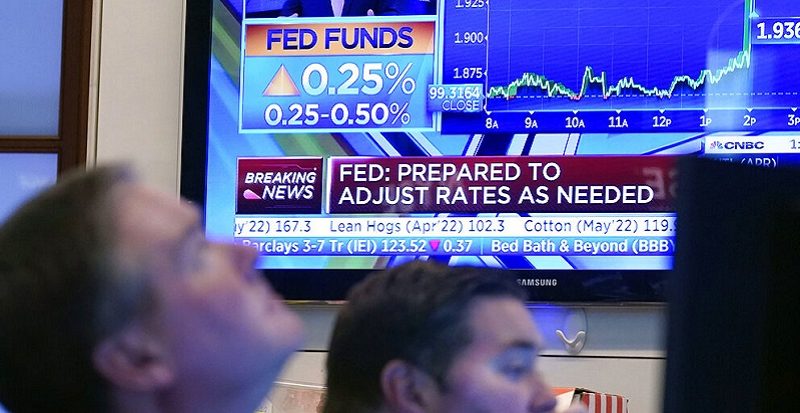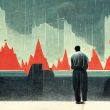by Jared Dillian, The 10th Man
The world does not need another take on Jackson Hole. But here we go.
The reason the market crapped out is because we have rate hikes without end. The Fed keeps moving the goalposts. First, we thought it would stop at 3.5%, then we thought it would stop at 4%, now… 4.5%. Five freaking percent? Where does it stop?
It stops when the Fed breaks something. Or at least, it seems that way.
If Chairman Powell had given us some clue, some hint that the Fed was getting close to the end of its rate hike campaign, then the market would have responded positively. But we have rate hikes without end. Down the elevator shaft we go.
This gets back to what I’ve said about the Fed all along—it always pursues the path of least embarrassment. Fed members were wrong about inflation initially, they were embarrassed, and they’re not going to make that mistake again. Instead, they’re going to make another type of mistake. They’re not going to make the same mistake two times in a row. That would be stupid. So, they’ll overdo it, which is exactly what is happening.
What does this mean for stocks? Heavy sledding. I think it’s unlikely we’ll make new lows, and equally unlikely we’ll come anywhere close to the highs. It’s going to suck for a while.
You see, this is why I’m not Mike Wilson, the CIO at Morgan Stanley. He would never say the stock market is going to suck for a while. But it will.
Groupthink
I find the whole thing kind of humorous. The Fed is just as enthusiastic about raising rates as it was about lowering them a few years ago. A few weeks ago, I wrote about Neel Kashkari, president of the Minneapolis Fed. He’s had the fastest ideological transformation in Fed history, going from the biggest dove to the biggest hawk. He said recently that inflation is a “raging inferno.” They’re all like that. It’s incredible.
People used to think the Fed was a dovish institution, but that wasn’t exactly true. It’s not that it was dovish, it just overdoes things in both directions. This is the same Fed that kept rates at zero for nine years and caused the bubble in the first place. It’s equally capable of hiking rates for nine years. I don’t mean to alarm anyone—it probably won’t do that—but you get what I mean.
The Fed is a consensus institution. It’s much harder for a group of people to change its mind than it is for a single person. There’s a lot of evidence that the Fed’s rate hikes are affecting the economy. Just look at the PMIs and the housing data. If the Fed were a dictatorship, so to speak, it would be much easier for it to respond to new information. And that’s what it was in the 1990s and 2000s when Alan Greenspan was Fed Chairman. He was a powerful chairman, and the rest of the FOMC had less of a voice.
The Greenspan Fed was a very proactive Fed, reacting quickly to changes in the economy. Our current Fed is like an aircraft carrier—impossible to turn around.
The problem is the Federal Reserve is the most important input in any investment thesis. You may have an idea to buy a stock, but if the Fed is hiking rates, it is simply not going to work. You have to get the Fed right first. And so many people analyze it incorrectly. The Fed fears being publicly wrong more than anything in the world.
Who Works at the Fed?
I have only known one Fed employee. He worked on the markets desk at the New York Fed. I met him in my associate class at Lehman, and he bounced around for a while, eventually landing at the Fed. He said the pay was not so good, but the benefits were amazing. He was an excellent guy, and I don’t mean to malign him, but I hope I never get to the stage of life where I’m working someplace for the benefits. I have higher ambitions than that.
The Fed also has 400 PhD economists on staff. If you are an economist at the Fed, I suppose the goal is to climb the ladder and become a Fed governor or president someday. The interesting thing about the current Fed is that most of the FOMC members, with Kashkari as a notable exception, spent their careers within the Federal Reserve system. This isn’t a good thing because you don’t really know how the economy works until you go out and participate in the business world. Powell worked in private equity, but he’s been at the Fed for a long time, so I suspect most of that knowledge has gone out the window.
Interest rates are the most important market price in the economy. I’m not sure why we leave it to a bunch of academics in non-risk-taking roles. Because the risks for everyone else are enormous.
Cosmic Prom
I’m having a big party in NYC on Friday, September 16—come on out! Here is the link for tickets. Meet me and a bunch of other subscribers. It’ll be a huge amount of fun.
Copyright © Mauldin Economics














